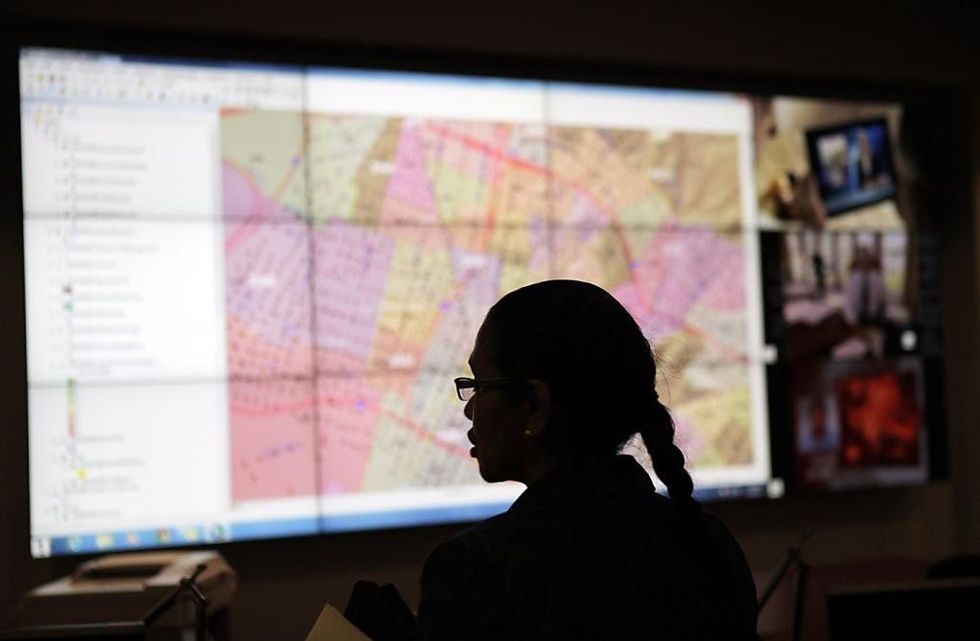On Oakland's Creepy New Surveillance Program

The so-called Domain Awareness Center (DAC) would consolidate a vast network of surveillance data. The project was initially supposed to be about port security. But in a classic illustration of mission creep, the project as proposed would have pulled in over 1,000 cameras and sensors pointed at Oakland residents, including 700 cameras in Oakland schools. While surveilling schoolchildren is not going to secure the Port of Oakland, it would allow for the comprehensive tracking of innocent Oakland residents. The DAC would enable the city to track individuals when they visit the abortion clinic, the Alcoholics Anonymous meeting, or the union hall, or engage in other private activities. Although proponents of the project claimed that it did nothing more than consolidate existing surveillance systems, the mere combination of surveillance data is extremely intrusive. A mosaic depicts far more information than any individual tile.
Shockingly, the City Council was poised to approve the project even though there was no privacy framework in place whatsoever. Although the City's proposed contract with a vendor to build the DAC took pains to prescribe in minute detail the precise manner in which, for example, metal framing systems are to be installed (studs are to be placed not more than 2 inches from abutting walls), there were no privacy provisions addressing key issues such as data retention and dissemination.
Disappointingly, and in the face of enormous opposition, the City Council voted on Tuesday to approve the DAC. The resolution it ultimately adopted requires the City Council to approve privacy policies and specifies which surveillance systems can be included in the DAC (the cameras in Oakland schools are no longer included). While the resolution contains a few nods to privacy, the City Council still put the cart before the horse. The City Council would never have approved a construction project, only to say that they'd review financial costs after the project is built. But it did just that with privacy costs.
An Urgent Message From Our Co-Founder
Dear Common Dreams reader, The U.S. is on a fast track to authoritarianism like nothing I've ever seen. Meanwhile, corporate news outlets are utterly capitulating to Trump, twisting their coverage to avoid drawing his ire while lining up to stuff cash in his pockets. That's why I believe that Common Dreams is doing the best and most consequential reporting that we've ever done. Our small but mighty team is a progressive reporting powerhouse, covering the news every day that the corporate media never will. Our mission has always been simple: To inform. To inspire. And to ignite change for the common good. Now here's the key piece that I want all our readers to understand: None of this would be possible without your financial support. That's not just some fundraising cliche. It's the absolute and literal truth. We don't accept corporate advertising and never will. We don't have a paywall because we don't think people should be blocked from critical news based on their ability to pay. Everything we do is funded by the donations of readers like you. Will you donate now to help power the nonprofit, independent reporting of Common Dreams? Thank you for being a vital member of our community. Together, we can keep independent journalism alive when it’s needed most. - Craig Brown, Co-founder |

The so-called Domain Awareness Center (DAC) would consolidate a vast network of surveillance data. The project was initially supposed to be about port security. But in a classic illustration of mission creep, the project as proposed would have pulled in over 1,000 cameras and sensors pointed at Oakland residents, including 700 cameras in Oakland schools. While surveilling schoolchildren is not going to secure the Port of Oakland, it would allow for the comprehensive tracking of innocent Oakland residents. The DAC would enable the city to track individuals when they visit the abortion clinic, the Alcoholics Anonymous meeting, or the union hall, or engage in other private activities. Although proponents of the project claimed that it did nothing more than consolidate existing surveillance systems, the mere combination of surveillance data is extremely intrusive. A mosaic depicts far more information than any individual tile.
Shockingly, the City Council was poised to approve the project even though there was no privacy framework in place whatsoever. Although the City's proposed contract with a vendor to build the DAC took pains to prescribe in minute detail the precise manner in which, for example, metal framing systems are to be installed (studs are to be placed not more than 2 inches from abutting walls), there were no privacy provisions addressing key issues such as data retention and dissemination.
Disappointingly, and in the face of enormous opposition, the City Council voted on Tuesday to approve the DAC. The resolution it ultimately adopted requires the City Council to approve privacy policies and specifies which surveillance systems can be included in the DAC (the cameras in Oakland schools are no longer included). While the resolution contains a few nods to privacy, the City Council still put the cart before the horse. The City Council would never have approved a construction project, only to say that they'd review financial costs after the project is built. But it did just that with privacy costs.

The so-called Domain Awareness Center (DAC) would consolidate a vast network of surveillance data. The project was initially supposed to be about port security. But in a classic illustration of mission creep, the project as proposed would have pulled in over 1,000 cameras and sensors pointed at Oakland residents, including 700 cameras in Oakland schools. While surveilling schoolchildren is not going to secure the Port of Oakland, it would allow for the comprehensive tracking of innocent Oakland residents. The DAC would enable the city to track individuals when they visit the abortion clinic, the Alcoholics Anonymous meeting, or the union hall, or engage in other private activities. Although proponents of the project claimed that it did nothing more than consolidate existing surveillance systems, the mere combination of surveillance data is extremely intrusive. A mosaic depicts far more information than any individual tile.
Shockingly, the City Council was poised to approve the project even though there was no privacy framework in place whatsoever. Although the City's proposed contract with a vendor to build the DAC took pains to prescribe in minute detail the precise manner in which, for example, metal framing systems are to be installed (studs are to be placed not more than 2 inches from abutting walls), there were no privacy provisions addressing key issues such as data retention and dissemination.
Disappointingly, and in the face of enormous opposition, the City Council voted on Tuesday to approve the DAC. The resolution it ultimately adopted requires the City Council to approve privacy policies and specifies which surveillance systems can be included in the DAC (the cameras in Oakland schools are no longer included). While the resolution contains a few nods to privacy, the City Council still put the cart before the horse. The City Council would never have approved a construction project, only to say that they'd review financial costs after the project is built. But it did just that with privacy costs.

